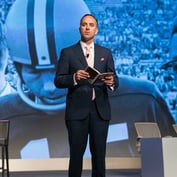(Bloomberg) — Every time he eats out in his hometown, billionaire investor Warren Buffett helps pay for police and firefighters to retire.
Like everyone else who dines at a restaurant in Omaha, Nebraska, Buffett is charged a 2.5 percent tax that’s used in part to defray $850 million in unfunded retirement expenses for city workers. The levy, in effect for more than three years, hasn’t closed the gap. So the mayor is trying to persuade employees to accept lower retirement payments.
Omaha is a prime example of what Buffett, the 83-year-old chairman of Berkshire Hathaway Inc., described this month as a tapeworm threatening government finances. States and localities from California to New York are struggling with how to shore up pensions that are underfunded by at least $1 trillion, according to the Nelson A. Rockefeller Institute of Government in Albany, New York.
“We are in a black hole and it’s going to take 45 years to get out of it,” said Omaha Mayor Jean Stothert, a Republican. “I’m not going to turn around and raise everybody’s taxes sky high and put it into the pension. The key is convincing unions this is something that must be done.”
‘Terrible shape’
Cities across the country are considering varied approaches to paying the bill. Philadelphia may sell a utility. Charleston, West Virginia, is weighing closing of fire stations, while Bloomington, Illinois, is considering new levies on concert tickets, bowling and trips to the zoo.
When Buffett called attention to pension shortfalls in a March 1 annual report to shareholders of Omaha-based Berkshire, he wrote: “Citizens and public officials typically under- appreciated the gigantic financial tapeworm that was born when promises were made.”
In a subsequent interview on CNBC, Buffett said Omaha pensions are in “terrible shape” even though the city has “a lot of resources” and is a “healthy community.” Buffett didn’t return a message left with an assistant.
Pension deficits emerged as the 18-month recession that ended in 2009 drove down stocks, trimming the value of investments used to pay benefits. Governments for years had also failed to put aside enough money.
In Chicago, the third most populous U.S. city, a “massive and growing” pension-fund shortfall could lead to insolvency, Moody’s Investors Service said in a report this month as it cut the municipality to three levels above junk grade. Detroit’s pension deficit, estimated at more than $3 billion, gained public attention last year as the city filed the largest U.S. municipal bankruptcy.
Bond rally
The shortfalls are affecting the $3.7 trillion municipal-bond market, even as a rally pushed benchmark 10-year yields to the lowest since June. Investors demanded an average of about 0.9 percentage point of extra yield to own local-government bonds instead of state debt in the first two months of the year, Bank of America Merrill Lynch data show. The gap was more than double the level of March 2011.
Elected officials said they’re being forced to make unpopular decisions.
Charleston, West Virginia, is considering the fire station plan to close a pension shortfall of about $250 million, said the city’s Republican mayor, Danny Jones.
“It’s going to be tough,” said Jones, citing years of failure to set aside money to fund retiree benefits. “We’ll come up with the money — fees will have to go up, services will have to be cut — but we’ll just have to do it.”
Philadelphia tax
In Philadelphia, whose pensions have an unfunded liability of $5 billion, Mayor Michael Nutter, a Democrat, has said he supports extending an extra 1 percent sales tax that was due to expire, using the proceeds partly to cover pension costs. The city also is considering selling its natural gas utility to raise pension money.
Bloomington, with a pension deficit of more than $120 million, is considering a utility tax that would increase bills for electricity, natural gas, water and telecommunications. An amusement levy would increase cable bills, zoo entry fees and movie ticket costs. If approved, the taxes would be used in part to help fund the shortfall.
Dean Baker, the co-director of the Center for Economic and Policy Research, a Democratic-leaning research group in Washington, said the severity of pension shortfalls is overstated, given that public agencies have decades to pay off the unfunded liabilities.








 March 11, 2014 at 09:06 AM
March 11, 2014 at 09:06 AM









